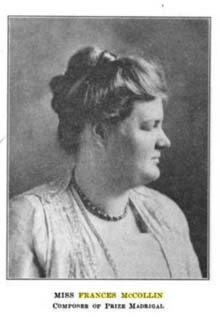
Listeners to Frances McCollin’s haunting In the Bleak Midwinter may be surprised to learn the composer couldn’t see the drifting snow or winter sky she evokes so beautifully in her piece, one of the highlights of WomenSing’s December concert series. Born with a progressive eye disease, McCollin became blind by the age of five. The vast body of work she was to compose would be inspired not by what she saw, but by her passion for sound and her abiding love for music.
“From the time I was a baby,” McCollin wrote in an early essay, “the world of sound was everything to me. . . Anything that could be listened to was my delight; church bells, canary birds, hand organs; everything from Beethoven to “Paradise Alley.” From the time I could walk, I loved to go and touch the piano.”
Surrounded by a loving and musical family, McCollin quickly developed her uncanny musical talent, composing melodies as early as age three that family members and friends would transcribe. Her father was her first music teacher, and young Frances demonstrated a sense of absolute pitch and an exceptional musical intelligence, comprehending every major and minor scale by the time she was six. She delighted in picking out different musical keys in the world around her. A train whistle, a music box, the neighborhood rooster, her mother’s voice; even the honk of a man blowing his nose she heard in a distinct key. McCollin also associated musical keys with colors; green reminding her of the key of E, and pink, F. It might seem odd to a sighted person for someone blind to think in terms of color, but for McCollin it was just one more manifestation of her keen imagination and unique musical sensibilities.
McCollin lived her sixty-seven years devoted to music, composing over 300 works, 95 of them published, and winning many musical prizes and accolades. In addition to composing, she taught and lectured with vivacity and a sense of humor, advocating for young musicians and new music. Her life was not an easy one and her musical success never did liberate her from dependence on her family. But McCollin did not consider her handicap an “affliction,” commenting in her autobiography that her blindness did not affect her happiness growing up where “love was the cornerstone of the whole family.”
Her richly textured In the Bleak Midwinter, never published or performed during McCollin’s lifetime, is a testament to the composer’s genius for absorbing the beauty of the world around her and translating it into sound.
WomenSing invites you to experience this magical music for yourself at our December concert series, Winter Reflections.
Written by Teresa Caldwell.
In the Bleak Midwinter
Poem by Christina Rossetti
In the bleak mid-winter
Frosty wind made moan;
Earth stood hard as iron,
Water like a stone;
Snow had fallen, snow on snow,
Snow on snow,
In the bleak mid-winter
Long ago.
Our God, heaven cannot hold Him
Nor earth sustain,
Heaven and earth shall flee away
When He comes to reign:
In the bleak mid-winter
A stable-place sufficed
The Lord God Almighty —
Jesus Christ.
Enough for Him, whom Cherubim
Worship night and day,
A breastful of milk
And a mangerful of hay;
Enough for Him, whom Angels
Fall down before,
The ox and ass and camel
Which adore.
Angels and Archangels
May have gathered there,
Cherubim and seraphim
Thronged the air;
But only His Mother
In her maiden bliss
Worshipped the Beloved
With a kiss.
What can I give Him,
Poor as I am? —
If I were a Shepherd
I would bring a lamb;
If I were a Wise Man
I would do my part, —
Yet what I can I give Him, —
Give my heart.








